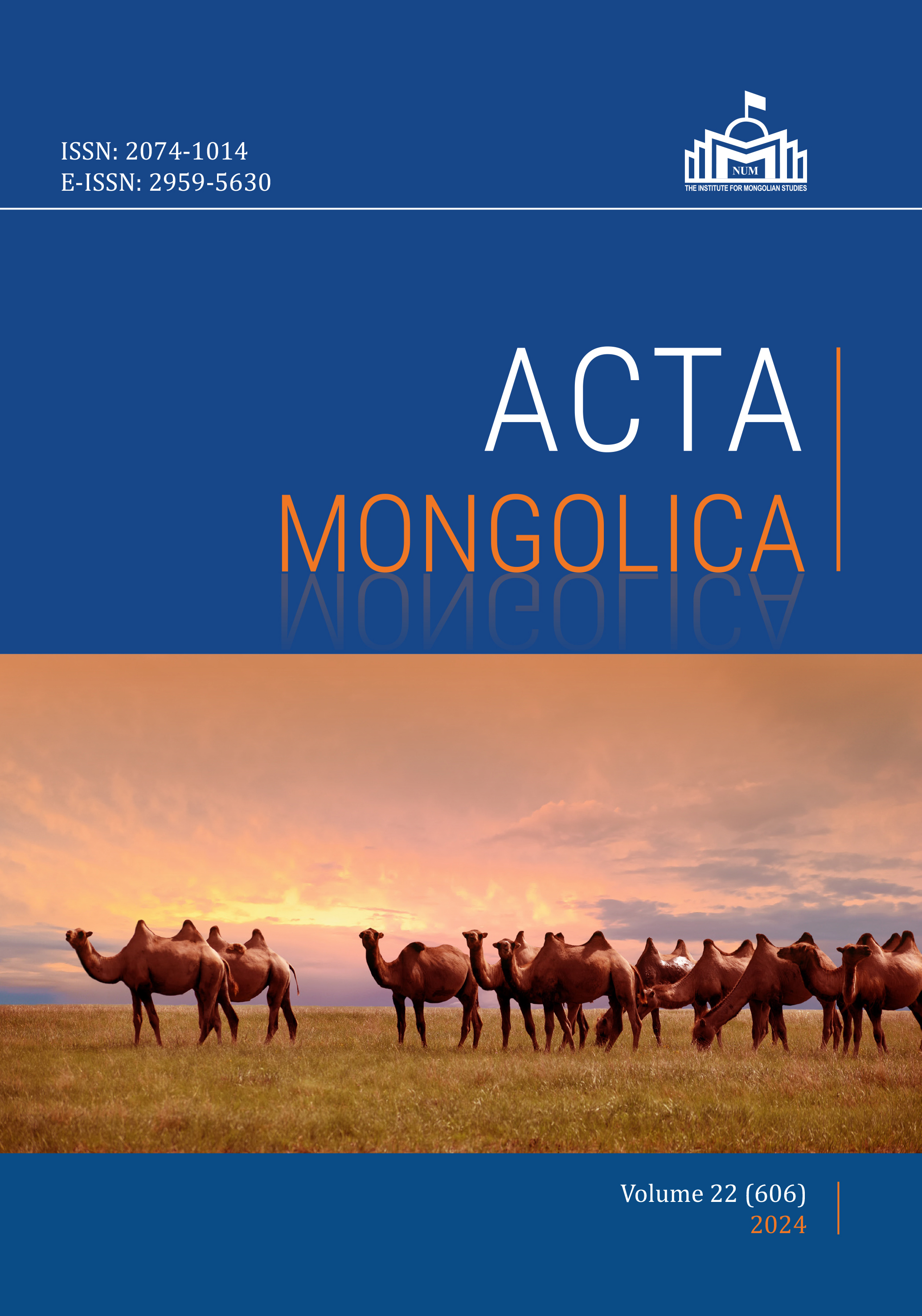Perspectives on Poverty and Respect in Mongolia Terms, taboos, taxonomies and the sustainability of translations
Main Article Content
Abstract
This article examines the complex and nuanced perspectives on poverty and respect in Mongolia, focusing on terms, taboos, and taxonomies surrounding poverty and their implications for a culturally appropriate phrasing. It highlights challenges of translations from a seemingly international development jargon into Mongolian, which often appear inadequate or even counterproductive.
Our research is based on a mixed-method pilot study investigating the connotations of Mongolian terms related to poverty. Through surveys, interviews, discourse analysis, etymological and semantic studies of poverty-related terms, the authors explored social challenges perceived by Mongolians including experiences of discrimination faced by those in ‘difficult living conditions’.
Moreover, we investigated the societal tendency to avoid addressing poverty directly in order to find out how it is connected to structural discrimination and the perpetuation of social inequalities. Given that terms may be acceptable in one context but disrespectful and stigmatizing in another, the authors advocate for a culturally sensitive use of terms. Based on the findings of our study, we provide constructive suggestions for a more appropriate terminology that focuses on empowerment and the expansion of opportunities. This analysis contributes to the understanding of complex dynamics between language, poverty, and social inclusion in Mongolia.
Article Details

This work is licensed under a Creative Commons Attribution-ShareAlike 4.0 International License.
References
Alexie, Sherman. (2007). The Absolutely True Diary of a Part-Time Indian. New York & Boston: Little, Brown and Company.
Alexie, Sherman. (2017). You Don’t Have to Say You Love Me. A Memoir. New York, Boston & London: Little, Brown and Company.
Barankow, Maria & Baron, Christian. (Hrsg., 2022). Klasse und Kampf. Berlin: Ullstein.
Baron, Christian. (2020). Ein Mann seiner Klasse. Autobiografie. Berlin: Claassen Verlag.
Bech, Glenn. (2022). Jeg anerkender ikke længere jeres autoritet. Kopenhagen: Gyldendal.
Bertelsmann Stiftung. (2020). Factsheet Kinderarmut in Deutschland. Online: https://www.bertelsmann-stiftung.de/fileadmin/files/BSt/Publikationen/GrauePublikationen/291_2020_BST_Facsheet_Kinderarmut_SGB-II_Daten__ID967.pdf.
Bourdieu, Pierre. (1982). Die feinen Unterschiede. Kritik der gesellschaftlichen Urteilskraft. Frankfurt/Main: Suhrkamp {frz. Original: La distinction. Critiqe sociale du jugement. Paris: Les Éditions de Minuit, 1979}.
Burzan, Nicole. (2007). Soziale Ungleichheit. Eine Einführung in die zentralen Theorien. 3., überarbeitete Auflage. Wiesbaden: VS Verlag für Sozialwissenschaften.
Choijav, Temulen (2021): ‘Beautiful Numbers’: Mobile Phone Numbers as Status Symbols in Mongolia. In: Ines Stolpe and Judith Nordby (Eds.): Horizons of Futures in Post-Utopian Mongolia. Berlin: EB-Verlag: pp. 345-367.
Dlabaja, Cornelia; Fernandez, Karina; Hofmann, Julia. (2023). Einleitung. In: Dies. (Hrsg.) Aktuelle Ungleichheitsforschung. Befunde – Theorien – Praxis. Perspektiven aus der ÖGS-Sektion Soziale Ungleichheit. Weinheim und Basel: Beltz Juventa.
David, Olivier. (2022). Keine Aufstiegsgeschichte. Warum Armut psychisch krank macht. Hamburg: Eden Books.
Dorjdagva, Javkhlanbayar; Batbaatar, Enkhjargal; Svensson, Mikael; Dorjsuren, Bayarsaikhan and Kauhanen, Jussi. (2016). Catastrophic health expenditure and impoverishment in Mongolia. In: International Journal for Equity in Health 15, 105: 1-9.
Enkh-Amgalan, Handaa. (2021). Stigmatized. Washington: New Degree Press.
Eribon, Didier. (2009). Retour à Reims. Paris: Fayard.
Escobar, Arturo. (1997). The Making and Unmaking of the Third World through Development. In: Majid Rahnema; Victoria Bawtree: The Post-Development Reader. London and New Jersey: Zed Books; Dhaka: University Press LDT; Halifax, Nova Scotia: Fernwood Publishing; Cape Town: David Philip: 85-93.
Gündsambuu, Chavchčin Chajanchjarvaagijn. (2002). Mongolyn nijgmiin davchraažil: chögžil, chandlaga. Ulaanbaatar: Mongol Ulsyn Zasgijn Gazryn Cheregzüülegč Agentlag Udirdlagyn Akademi.
Haraway, Donna. (1988). Situated Knowledges. The Science Question in Feminism and the Privilege of Partial Perspective. In: Feminist Studies 14(3): 575-599.
Kohl-Garrity, Elisa. (2019). The Weight of Respect. Khündlekh Yos – Frames of Reference, Governmental Agendas and Ethical Formations in Modern Mongolia. Dissertation, defended at the Max Planck Institute for Social Anthropology, Halle/Saale.
Louis, Édouard. (2014). En finir avec Eddy Bellegueule. Paris: Éditions du Seuil.
Louis, Édouard. (2021). Changer: méthode. Paris: Éditions du Seuil.
Mayer-Ahuja, Nicole & Nachtwey, Oliver. (Hrsg., 2021). Verkannte Leistungsträger:innen. Berichte aus der Klassengesellschaft. Berlin: Suhrkamp.
NÜB-yn Chögžlijn Chötölbör. (2021). Mongol Ulsyn chögžlijn bodlogyn barimt bičig bolon togtvortoj chögžlijn zorilgo choorondyn ujaldaa, tojm šinžilgee. Ür dün, dügnelt, sanal zövlömž. Ulaanbaatar: NÜB-yn Chögžlijn Chötölbör.
Ohde, Deniz. (2020). Streulicht. Berlin: Suhrkamp.
Pfaff, Nicolle; Rabenstein, Kerstin. (2018). Einführung in den Schwerpunkt: Rekonstruktive Ungleichheitsforschung. In: ZQF 19. Jg., Heft 1+2/2018: 5‒12.
Poppe, Nicholas. (1954). Grammar of Written Mongolian. Wiesbaden: Harrassowitz (second printing: 1964).
Sayram, Iris. (2022). Für euch. Berlin: Claassen.
Stiglitz, Joseph E. (2012). Der Preis der Ungleichheit. München: Siedler Verlag.
Stolpe, Ines. (2008). Schule versus Nomadismus? Interdependenzen von Bildung und Migration in der modernen Mongolei. Frankfurt a.M., Berlin, Bern, Bruxelles, New York, Oxford, Wien: Peter Lang.
UNDP. (2020). Human Development Report 2020: Mongolia. The Next Frontier:
Human Development and the Anthropocene. Briefing note. Summary: https://www.undp.org/sites/g/files/zskgke326/files/migration/mn/HDR2020_Mongolia-Summary_English.pdf.
UNDP. (2021). National Statistics; Government of Mongolia/Ministry of Finance; Information Technology Center of Custom, Taxation and Finance; National University of Mongolia; UNDP: Kovid-19 Car tachlyn üjeijn jaduural, tegš bus bajdlyg ich ögögdöl ašiglan sudlach n’. Ulaanbaatar: NÜB.
Vietze, Hans-Peter. (1988). Wörterbuch Mongolisch-Deutsch. Leipzig: Enzyklopädie.
Ziai, Aram. (2006). Die Bank, die Armen und der Markt. Ideologische Mechanismen im Weltbankdiskurs (Kapitel 11). In: Ders.: Zwischen Global Governance und Post-Development. Entwicklungspolitik aus diskursanalytischer Perspektive. Einsprüche 17. Münster: Westfälisches Dampfboot: 138-148.
Ziai, Aram. (2010). Zur Kritik des Entwicklungsdiskurses. In: APuZ 10/2010, S. 23-29.

